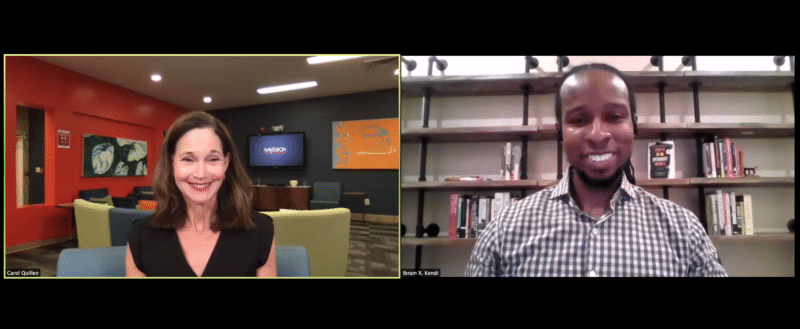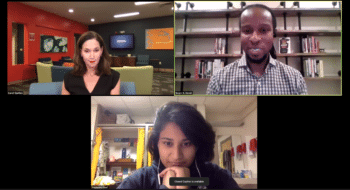NEWS
Reynolds Lecture at Davidson College: Ibram X. Kendi

Davidson College president Dr. Carol Quillen was in conversation with Dr. Ibram X. Kendi as the annual Reynolds Lecture was a virtual event this year.
The Reynolds Lecture, one of Davidson College’s flagship lecture events, was endowed in 1959 through funding from the Z. Smith Reynolds Foundation, intended to bring “a speaker of international renown in the arts, humanities, sciences, and public affairs” to campus as the Reynolds Lecturer.
Scores of luminaries have visited our town as Reynolds Lecturers since 1960, packing Love Auditorium (now gone) and now the Duke Family Performance Hall with students, faculty, staff, and other members of our community. To set the bar, just a few examples: John Kenneth Galbraith, Paul Tillich, Ralph Ellison, Cornell West, Jane Goodall, Gloria Steinem, and Richard Powers. More recently, we’ve had the opportunity to hear from Nicholas Kristoff, Allison Bechdel, Ta-Nehisi Coates, Janet Mock, and Bryan Stevenson.
But how to bring such a personage to campus in 2020, the time of Covid?
Fortunately, 2020 is also the time of online meeting platforms, and in a giant Zoom webinar held on Tuesday, Sept. 22, Davidson College virtually welcomed one of America’s foremost historians and leading antiracist voices, Ibram X. Kendi, as the annual Reynolds Lecturer.
Wow. Here’s the deal on Kendi from the Boston University website:
Ibram X. Kendi is the Andrew W. Mellon Professor in the Humanities and the founding director of the Boston University Center for Antiracist Research. He is a National Book Award-winning and #1 New York Times bestselling author, as well as a contributing writer at The Atlantic and a CBS News correspondent. He is the 2020-2021 Frances B. Cashin Fellow at the Radcliffe Institute for Advanced Study at Harvard University.
Kendi is the author of “The Black Campus Movement,” which won the 2012 W.E.B. Du Bois Book Prize, and “Stamped from the Beginning: The Definitive History of Racist Ideas in America,” which won the National Book Award for nonfiction in 2016.

After the initial discussion, a number of Davidson students were able to ask questions directly to Dr. Kendi. Toshaani Goel asked Kendi what new citizens could do to be more involved in the process.
So, back to Tuesday night. Members of the college community, as well as alumni, nationally and globally, were invited to the online event. This week the college was able to open the invitation more widely to the public. With nearly 5,000 viewers in “attendance,” more folks by far were in the audience than for any previous Reynolds Lecture.
After introductions, our laptops were divided between the faces of President Carol Quillen, a historian by training, and our visitor, Ibram Kendi. Quillen posed questions and Kendi responded, thoughtfully, even gently, and often with the warmest of smiles. A handful of students, distancing in their dorm rooms, engaged him, as well.
How was it? Gripping, in a quiet way. Instructive. Discomfiting. Not the least bit diminished by the digital format—and possibly enhanced. There’s no satisfactory way to cover the content, but here are a couple notes.
Kendi characterized racism as the American cancer, a “juggernaut.” He spoke, too, about the critical importance of voting, saying that “politics is power.” Americans who don’t do politics, he said, fail to exercise our main source of power to influence policy.
To sharpen his point about voting this year, Kendi said, ”The only election in history more impactful that this was the Election of 1864. If Lincoln had not been elected, I would still be a slave.”
It is clear that Ibram X. Kendi would have us exercise our power.
Meg Kimmel
A professional communicator with a long career in higher education, Meg now consults and volunteers in areas where words and images work together to tell a story. She's a proud member of Davidson's Class of 1977 and lives nearby with her husband, Don, Davidson professor emeritus of biology, with whom she shares a family grown by kinship and choice.


